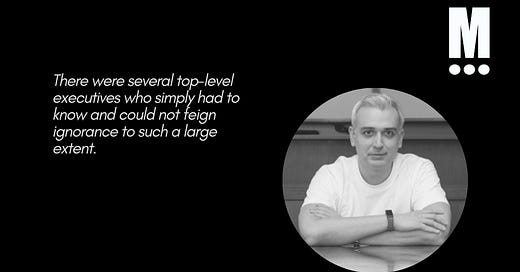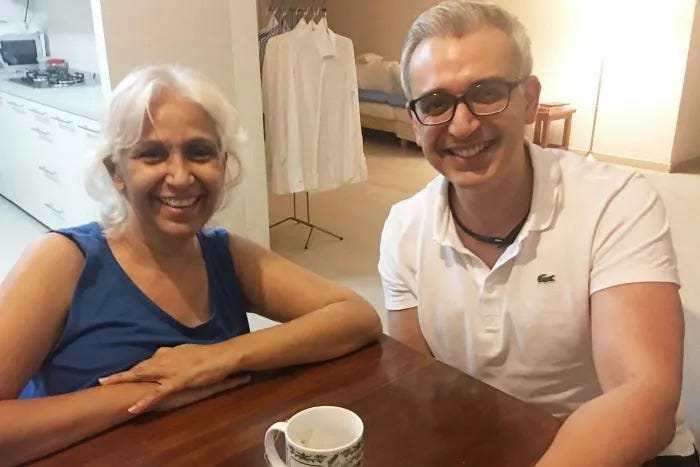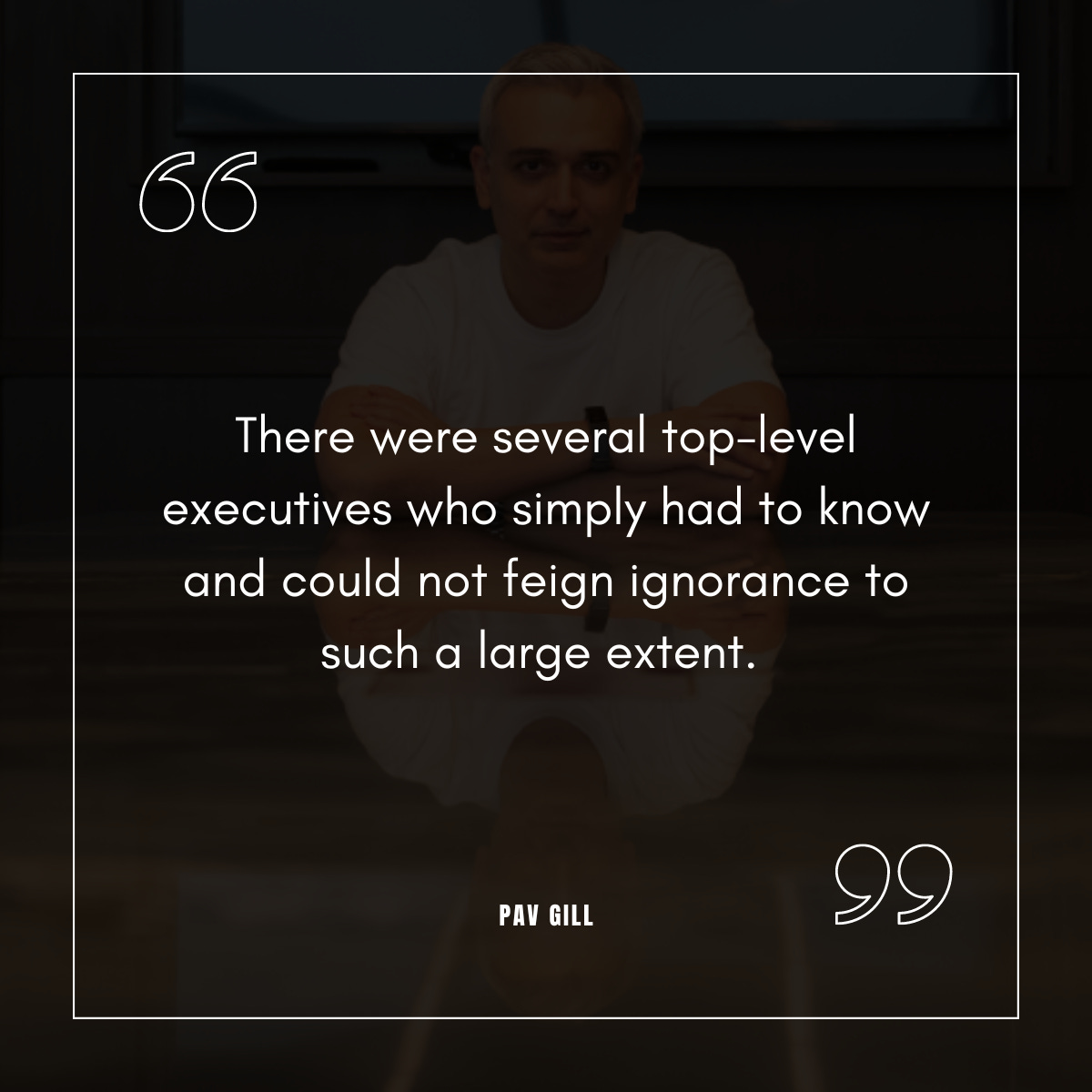Exclusive: Q&A with Pav Gill, Wirecard’s whistleblower
"There were several top-level executives who simply had to know and could not feign ignorance to such a large extent."
Today I have a really special Q&A to share with you.
This week I interviewed Pavandeep (Pav) Gill, better known as the Wirecard Whistleblower.
Two weeks ago, I wrote about the Netflix documentary about the Wirecard scandal.
I’m sure you have watched it by now and would have noticed the role of Pav as the whistleblower from Singapore who approached and provided the Financial Times (FT) with the evidence critical to exposing Wirecard.
Since the documentary is primarily focused on the FT’s perspective, his role is limited in the series. I, therefore, decided to take this opportunity to interview Pav and shine a brighter light on his role and some events that didn’t catch too much attention in this particular documentary. I was in contact with Pav for a while, and I’m very thankful for this interview I can share with you today.
The things he shared were even more impressive than I was already aware of, and he also shared some fantastic footage with me, that I would like to share with you as well.
👉 If you would like to see this amazing bonus footage on the Wirecard scandal, drop a comment below, and Pav and I will send you the material/footage!
Now let’s get to it!
As mentioned, the Netflix docu focuses on FT’s perspective. For that reason, they did not include all events in the documentary. Are there any events you could share with us that might be interesting?
Yes, definitely. For one, what most probably are unaware of is the fact that there was an "omni-channel" type effort involved from my part in bringing down Wirecard in addition to providing the FT with the material necessary to expose Wirecard for what it was i.e. the largest financial scandal in Germany’s history. While the FT played a tremendous role in exposing Wirecard, it is important to remember, that following once the first few FT articles were published,:
BaFin pretty much defended Wirecard from the get-go;
Wirecard engaged in multiple smokescreen attempts, for e.g. by putting out a ‘short-seller conspiracy’ culminating with the infamous recordings involving Nick Gold;
Softbank's share-price-saving "investment" (which was later found out to be not directly by Softbank but by a few of its executives) into Wirecard; and
multiple untruths publicly by way of conflicting responses by Wirecard board members, etc.
It's when these things started happening that I quickly created my Twitter persona under the handle @laan_pa.
Twitter was utilised by me to anonymously post stuff over the course of 1.5 years that the media could not post for reasons (legal or otherwise).
I subsequently also realised that what needed to be done was to change the perspective of the saga from within Germany once the FT's reporting was pretty much neutralised by BaFin defending Wirecard, naysayers casting it as fake news once again, an attack by the British media on a German ‘fintech darling’, and so on...
This was when I approached the Suddeutsche Zeitung (SZ) with even more material. The SZ subsequently published their first expose on Wirecard titled Wirecard: The Pheonix from Aschheim. It was a turning point in Germany as it appeared that, for the first time, it was no longer the FT raising questions but a large and highly respectable German news outlet doing so.
As time went on, the rest of the German media started reporting in a less pro-Wirecard manner. Because of laan_pa's activities on Twitter, prominent hedge funds got involved (e.g. TCI) in due course, eventually leading to the KPMG review.
One thing they left out of the Netflix doc is the role of your mother. And I know her role was quite interesting and big. Can you tell me more about that?
Indeed so. My mom was the one that first reached out to the Wall Street Journal under a pseudonym. Unfortunately, the WSJ were not interested and did not even reply. She then reached out to Claire Rewcastle Brown (the journalist behind exposing the infamous 1MDB scandal involving the Malaysian government and their ex-Prime Minister, Najib Razak). Claire examined the material and informed us that Dan McCrum of the FT had been following Wirecard for a few years now and he would therefore be best placed to take a lead on the story.
Once FT was provided with the most (but not all) of the material I had, it took circa 4 months to publish the first article, which naturally led to a bit of frustration on my part.
You mentioned in a podcast that you found out that your old boss at Wirecard, Edo, who has been on the run since 2019, now lives in Dubai under an alias. How did you find out?
Edo was not my boss.
I operated as the primary counsel for all of Wirecard's 11 markets in the Asia-Pacific region and reported to one of the Heads of Legal in the Munich headquarters.
Edo was pretty much the 3rd most powerful finance person in the entire Wirecard organisation who, despite having a direct reporting line to Stephan von Erffa (Wirecard’s then Deputy CFO), had, from what I was made to understand, the ears of Jan Marsalek and Burkhard Ley.
I was recently indirectly informed of his new name, "Henry" and the fact that he is residing in Dubai by a friend of his wife's who was present previously at his wedding.
Where do you think Jan Marsalek is hiding? Any news on that..?
He has been found living under a new name and passport in Moscow.
Further details can be found here.
A lot is talked about there were two Wirecards. A company where most employees believed they were working for a legit listed payment provider and working hard to grow the business. And a part of the company with a select group of people running the company like a 50’s KGB operation. How do you look at this?
This is true and can only be looked at after what happened.
There were several top-level executives who simply had to know and could not feign ignorance to such a large extent. It still makes me totally bemused when I hear that Markus Braun is casting himself as a victim.
Did the German court interview you already for the cases around Wirecard? I know that was not the case last year.
No.
Do you expect this to happen anytime soon? And why do you think so?
I have no idea.
How is life treating you after all the events at Wirecard? You won a prize for your activities as a whistleblower last year, right?
Life is alright though there have been several personal challenges e.g. dealing with aspects of PTSD after what I had gone through. Had the BaFin or any responsible agency done the right thing and even bothered to sit and sift through the material which the FT handed to them on a platter (yes - pretty much did their jobs for them), a lot of these issues would have been handled sooner and in a less negligent/blaise manner.
Yes, I have been awarded a couple of awards, namely:
the 2021 Blueprint for Free Speech “Special Recognition Award” for integrity and bravery in the public interest, and
the 2022 ACFE “Cliff Robertson Sentinel Award” - one of the ACFE’s highest honours bestowed annually on a person who, without regard to personal or professional consequences, has publicly disclosed wrongdoing in business or government.
What are you out to since you left Wirecard and the whole storm finally calmed down? Where do you live, and how is business?
I was living and working in Bangkok for the past two years, but now I am pretty much a digital nomad as my company is in an insolvency moratorium phase. Hence, I am back to the drawing board job-wise, which is unfortunate as it was a wonderful young crypto exchange startup where I was its Chief Legal Officer that, together with the rest of the C-level executives grew the company from 40-odd staff to >400 in about a year.
People now know you as the famous whistleblower, but there must be something interesting people don’t know about you.
Yes, tonnes of stuff, but it would be better if they got to know me in person to find out!
If you could recommend one book to read, which one would this be (it doesn’t have to be related to Wirecard, of course)?
I am a huge fan of Stephen King's books, but the last book I read is Upgrade by Blake Crouch.
You came to Wirecard as a professional with a lot of ambition. After everything that happened, are you still as ambitious? What are your new goals business-wise? What are you looking for/to achieve?
I would like to help companies succeed in the digital assets and/or payments space and be recognised as a key opinion leader in the legal and compliance aspect of these industries.
It’s a story that keeps amazing me, and it's truly inspiring to see how Pav, and don’t forget his mother, stood up and kept going. I’m sure most of us would have given up or given in. By not giving in and pushing through, he did the whole world and the FinTech space a huge favor.
The collapse of Wirecard was a blow to the global fintech industry, but it could have been so much worse if it had remained unchecked.
Pav’s role in this was critical, and I can only thank him for his honesty and collaboration during this interview. A true inspiration!








The real hero in this whole affair is Pav’s Mum